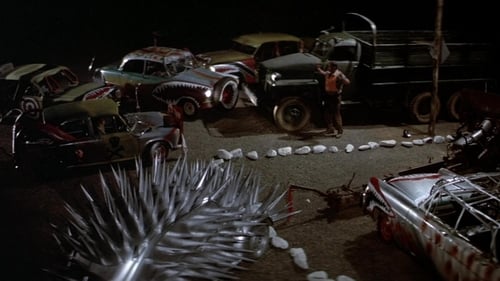
Writer
Part 3 of the History of Australian Cinema series. The story of the Australian film industry in the 1930s, from the pioneering days of talkies through to the decline of the industry with the coming of WWII.

Director
Part 3 of the History of Australian Cinema series. The story of the Australian film industry in the 1930s, from the pioneering days of talkies through to the decline of the industry with the coming of WWII.

Story
겉으로 보기엔 너무나 평화롭게 느껴지는 시골 마을 파리. 그러나 파리로 가는 길이 죽음으로 가는 길임을 아무도 모른 채 여행객들은 이 마을을 찾아온다. 파리의 사람들은 함정을 만들어 자동차를 빼앗아서 살아가는데, 여기서 죽은 자는 폐기되고 다친 자들은 특수한 '치료'를 받은 후 마을의 거대한 지하 병원에 감금된다. 이 죽음의 함정으로 조지와 아서 왈도가 들어오게 되면서, 파리의 몰락은 시작되는데...

Director
The Hungry Miles is a documentary made by the Waterside Workers Federation Film Unit. It documents industrial relations on the waterfront since the 1930s and includes dramatised scenes of working conditions during the Depression. It also recounts the background to the Federal Governments 1954 amendments to the Stevedoring Industry Act, which proposed to give shipowners the right to directly recruit wharf labour and bypass the union; shows workers demonstrating; contrasts the gap between industry and workers in the division of profits; and evokes the spirit of the Eureka Stockade in portraying the solidarity amongst waterside workers.

Self
During the height of the Cold War, the Waterside Workers' Federation Film Unit produced eleven (11) films for several trade unions on political and industrial issues. Independent film-makers worked with them to develop critical dialogue from one generation of concerned film-makers onto another. FILM-WORK looks at sequences from 4 of these films and interviews some of their makers, raising a diversity of issues pertinent to current debates in film, history and politics. The 4 films that are looked at are PENSIONS FOR VETERANS (1953, NSW Branch, WWF), THE HUNGRY MILES (1954, WWF), NOVEMBER VICTORY (1955, WWF), and HEWERS OF COAL (1953, Miners Federation). PENSIONS FOR VETERANS covers the issue of the need for pensions to be given to workers who have worked on the waterfront all their life. THE HUNGRY MILES shows the strength of the workers, the union and its democracy. HEWERS OF COAL is about the coal miners and their struggle to get better working conditions and pensions.

Director of Photography
A comedy portraying four unpopular and undesirable types of waterfront worker - Glass-arm Harry (a shirker), Tiddly Pete (a drunk), Nick-away Ned (a believer in 'shorter' working hours) and Ron the Roaster (a know it all and loud mouth). All played with great comic effect by Jock Levy. Shot on the wharves at Walsh Bay, Sydney with the aim of educating workers that this type of behaviour damages the union and provides bosses and the media with an excuse to make baseless generalisations about all waterfront workers.

Director
A comedy portraying four unpopular and undesirable types of waterfront worker - Glass-arm Harry (a shirker), Tiddly Pete (a drunk), Nick-away Ned (a believer in 'shorter' working hours) and Ron the Roaster (a know it all and loud mouth). All played with great comic effect by Jock Levy. Shot on the wharves at Walsh Bay, Sydney with the aim of educating workers that this type of behaviour damages the union and provides bosses and the media with an excuse to make baseless generalisations about all waterfront workers.

Director
Film made in support of a campaign by the Waterside Workers Federation seeking pensions for older waterside workers. It depicts the hardships veterans, particularly older workers as well as some of the health and economic issues they endure. Shows a delegation of older workers, led by the WWF's Jim Healy and Tom Nelson boarding a bus in Sydney and travelling to Canberra, where they gather outside Parliament House. Climaxes with a mass meeting of waterside workers at Leichhardt Stadium and concludes with a group of elderly wharfies walking along the Sydney docks.

Director of Photography
Film made in support of a campaign by the Waterside Workers Federation seeking pensions for older waterside workers. It depicts the hardships veterans, particularly older workers as well as some of the health and economic issues they endure. Shows a delegation of older workers, led by the WWF's Jim Healy and Tom Nelson boarding a bus in Sydney and travelling to Canberra, where they gather outside Parliament House. Climaxes with a mass meeting of waterside workers at Leichhardt Stadium and concludes with a group of elderly wharfies walking along the Sydney docks.








